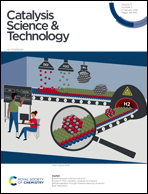Thermal cracking of CH3Cl leads to auto-catalysis of deposited coke†
Abstract
Thermal cracking of CH3Cl was studied on SiO2 particles at 0.4 MPa, from 375 to 550 °C. The cracking occurs at temperatures higher than 400 °C and leads to the formation of solid coke composed of chlorinated hydrocarbons. This coke is active as it catalyses the CH3Cl cracking at temperatures lower than those required for the thermal cracking, leading to the formation of HCl, CH4 and hydrocarbons. Cl present in this coke is responsible for its activation.



 Please wait while we load your content...
Please wait while we load your content...